|
Spinal Tap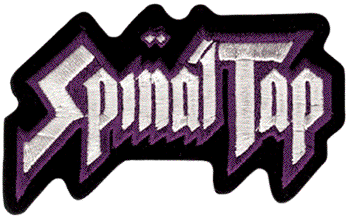 The best humor is invariably laced with cruelty, garnished with cynicism and lightly sprinkled with an earnest, desperate desire to be loved.
The best humor is invariably laced with cruelty, garnished with cynicism and lightly sprinkled with an earnest, desperate desire to be loved. Which is pretty much the recipe for This is Spinal Tap, the now classic rock-mockumentary which in the process of lampooning one genre pretty much created a whole new one. This is Spinal Tap was the first feature film ever directed by Rob Reiner, but the band itself was first invented by its stars, Michael McKean, Christopher Guest and Harry Shearer, portraying David St. Hubbins, Nigel Tufnel and Derek Smalls respectively. The band debuted as a throwaway sketch on a forgettable TV skit comedy show in the late 1970s. Reiner took it on as a film project, mostly because he was painfully desperate to get people to stop calling him "Meathead." (It didn't work.) Spinal Tap didn't start out with the most original concept. In 1978, Monty Python's Eric Idle had debuted a modestly forgettable mock rockumentary called The Rutles, which had also begun as a TV comedy sketch (on Saturday Night Live). The film specifically lampooned The Beatles and their music. What This is Spinal Tap brought to the mix, however, was an innovative approach to actually making the movie. Spinal Tap was largely improvised by the actors. Reiner put them in front of the cameras, got them talking (through faux interviews playing the "director" of the film, Marty DeBergi), and just recorded the results. (Rumor has it there is a 9-hour bootleg version of the movie circulating out there somewhere.)
Fortunately, you are there, thanks to the mock verite style of the film. The movie tracks the "comeback tour" of the 1980s hair metal band as things go from bad to worse, occasionally diverting into inspired musical numbers with titles like "Big Bottom" and "Tonight I'm Gonna Rock You Tonight," and lyrics like "You're too young / and I'm too well hung" and "My baby fits me like a flesh tuxedo / I love to sink her with my pink torpedo." While the musical numbers click (the actors genuinely wrote and performed all the music, unlike the Monkees), it's the interview segments that really make the movie work. Spinal Tap fans quote the movie with the same obscurantist, geek-chic social ineptness frequently demonstrated by the followers of Monty Python and Star Trek.
HUBBINS: It's an unusual name, well, he was an unusual saint, he's not a very well known saint.
DIBERGI: Oh, there actually is, uh... there was a Saint Hubbins?
HUBBINS: That's right, yes.
DIBERGI: What was he the saint of?
HUBBINS: He was the patron saint of quality footwear.
TUFNEL: You know, just simple lines intertwining, you know, very much like... I'm really influenced by Mozart and Bach, and it's sort of in between those, really. It's like a Mach piece, really. It's sort of...
DIBERGI: What do you call this?
TUFNEL: Well, this piece is called "Lick My Love Pump."
TUFNEL: Well, it's one louder, isn't it? It's not ten. You see, most blokes, you know, will be playing at ten. You're on ten here, all the way up, all the way up, all the way up, you're on ten on your guitar. Where can you go from there? Where?
DIBERGI: I don't know.
TUFNEL: Nowhere. Exactly. What we do is, if we need that extra push over the cliff, you know what we do?
DIBERGI: Put it up to eleven.
TUFNEL: Eleven. Exactly. One louder.
DIBERGI: Why don't you just make ten louder and make ten be the top number and make that a little louder?
TUFNEL: (Extremely long pause) These go to eleven. Overall, the mockumentary style and ad-libbed performances were so effective that many people didn't realize the film was a parody. Rob Reiner reported that many people approached him to commend the film, but suggested he should have picked a better-known band to profile. In addition to its whopping box office gross of, uh, $5 million, Spinal Tap was a powerful influence on the multi-billion, uh, multi-million... well, let's just say lucrative mockumentary film genre, inspiring such later film blockbust... er... movies like Waiting for Guffman, Best in Show and A Mighty Wind. All of which, quite coincidentally, featured Tap star Christopher Guest either in front of, or behind, the camera. Hey, stick with what works. (There was also Bob Roberts, an extremely biting and modestly successful political mockumentary which featured the extraordinary distinction of absolutely zero Guest involvement.) A Mighty Wind reunited the three main Spinal Tap stars, who stretched their acting abilities to portray a washed-up folk band instead of a washed-up metal band. Daring! The three also reunited for a 1992 TV movie reunion which came and went with little fanfare.
Perhaps the most fitting tribute to Spinal Tap can be found obscurely tucked away as an Easter Egg in the Internet Movie Database's "user rating" bar (in the paid subscription section of the site), which measures a movie's worth based on a score of 1 to 10. Although IMDB users only gave the movie a 7.9 rating, the graph goes to eleven. Maybe someday, baby...
Cameos in Spinal TapPlaying "catch the celebrity" is one of the fun parts of watching This is Spinal Tap. Here are just a few to look out for (these are the easy ones):
Timeline
|
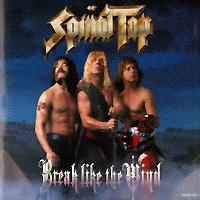 So where The Rutles was structured along the more traditional lines of set-up/punchline comedy, Spinal Tap just kind of flowed. And that made all the difference. Instead of the traditional ba-da-bing pacing of a scripted comedy, Spinal Tap had the feel of a late-night dorm room descent into absurdity, the sort of thing that's really funny but you had to be there.
So where The Rutles was structured along the more traditional lines of set-up/punchline comedy, Spinal Tap just kind of flowed. And that made all the difference. Instead of the traditional ba-da-bing pacing of a scripted comedy, Spinal Tap had the feel of a late-night dorm room descent into absurdity, the sort of thing that's really funny but you had to be there.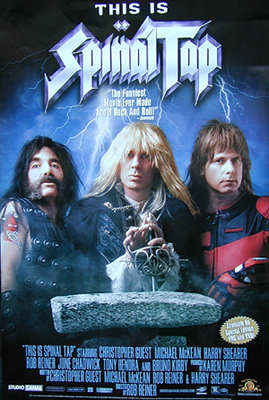 The more memorable exchanges roll through the surreal with an absolute absence of self-consciousness:
The more memorable exchanges roll through the surreal with an absolute absence of self-consciousness: 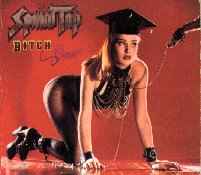
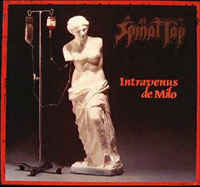 Some of the better zingers have passed into the popular vocabulary, most memorably, "It's such a fine line between stupid and clever" (always an important point to remember).
Some of the better zingers have passed into the popular vocabulary, most memorably, "It's such a fine line between stupid and clever" (always an important point to remember).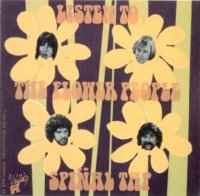 The legend lives on, with the Tap members occasionally reuniting for TV guest shots on
The legend lives on, with the Tap members occasionally reuniting for TV guest shots on